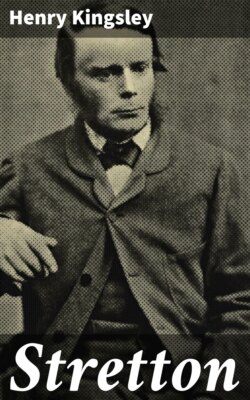Читать книгу Stretton - Henry Kingsley - Страница 5
На сайте Литреса книга снята с продажи.
Chapter 3.
ОглавлениеTable of Contents
The sudden and very lamentable death of Squire James Evans in the hunting-field threw a gloom, not in the mere newspaper acceptation of the term, but in reality, over that part of Shropshire, for nearly a week. He was a most deservedly popular man, and what they wrote on his tomb was every word of it true. He was a good son, a good husband, a good father, a good landlord, a pious churchman, a firm friend, and he died without one single enemy. One little fact was omitted from his tombstone: he died without being reconciled to his son, at least formally. There may have been a reconciliation at heart, and those low, inarticulate moans, as he lay dying in his groom's arms in the ditch, may have been the attempted expression of it; but the mouth was loose in death before they were ever uttered.
Mrs. Evans was not long after him. She was aged and worried, and she moped and brooded until she died. The old clergyman who attended her at the last, left her at the very last with a dissatisfied and rather puzzled face. Eleanor she would not see for the last four days.
Well, she died. And it took nearly six months to communicate to Squire Charles his most sudden and unexpected succession. He came home at the end of a year, and found Eleanor, his sister, in possession, keeping all things square for him: receiving rents, bullying attorneys, walking up and down among the farms, in a dress which was considered remarkable even in those times, and attending to the wants of the tenants. She had practically given one of the family livings away, quite illegally, though the young curate to whom she gave it took possession as a matter of course. On the other hand, she bad been rather tight with the tenants on the subject of repairs; and, it is reported, used the word "humbug," just then coming into fashion, on more than one occasion. They tell an idle tale, those Shropshire folks. They say that she and the steward were standing together on the terrace, when Squire Charles rode up, on his return from India; that the steward said, "Thank Heaven, he has come at last!" And that Aunt Eleanor said, "I quite agree. Now you and he take the estates in hand, for I am sick of it; and a nice mess you will make of it together, you two."
They did nothing of the kind, however. The property did rather better under the more liberal rule of Squire Charles than under the near and close rule of his sister, Eleanor. Women are apt to be very near and mean in business. They will give as few men will give, but they will haggle about sixpence, while they are irritating a good tenant. Was not the Antiquary, as near a man as another, upbraided by his usually submissive womankind for "raising the price of fish on them"?
Eleanor the beautiful whiffed away from her brother's establishment at once, leaving him to manage his somewhat irritated tenants, and retired to her own farm at Pulverbatch. She marched off with her young child Gray.
The scandal about Charles Evans and Elsie Gray was known to very few persons, and was now almost forgotten even by those few: scarcely half a dozen all told. As for the county, they had never heard of it, and even if they had, would have taken small note of it, for there were plenty of scandals of the same kind in any one their families. If it had got wind, the more ill-natured of them would have been pleased at such a fiasco occurring in such a saint-like family as the Evanses. But then it never did get wind, and Charles Evans was welcomed to his ancestral halls by the county generally, with lute, sackbut, psaltery, dulcimer, and all manner of musical instruments. He lied a little, I doubt, at the very first reception, for on being inquired of by the county, where was his Eleanor, he replied that she was not well, and having been overpowered by his sudden return, had gone home to her farm at Pulverbatch: whereas, the truth was that she was perfectly well, and had told him the day before that she was not in sufficient temper to meet all these idiots, and walked off to Pulverbatch, promising to come back to him as soon as he had got rid of his fools.
Yet they had had a pleasant meeting these two: worth giving perhaps. He took her in his arms, and she wound her fingers in his hair. And he said--
"Love all the same, sister?"
And she said: "Not all the same, but more."
"Has anybody been?" said the brother.
"I should like to see them," said the sister. "My dear, I must marry you. No other arrangement is possible. Get rid of these fools, and find yourself a good wife, and I will come back and marry the pair of you."
"But who is to marry you?" said the brother.
"You," said the sister.
